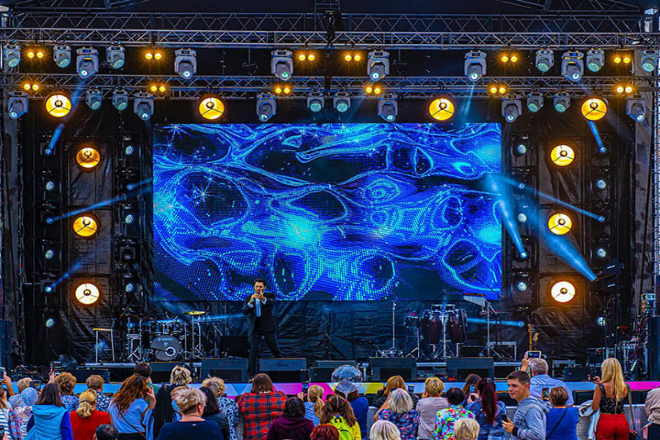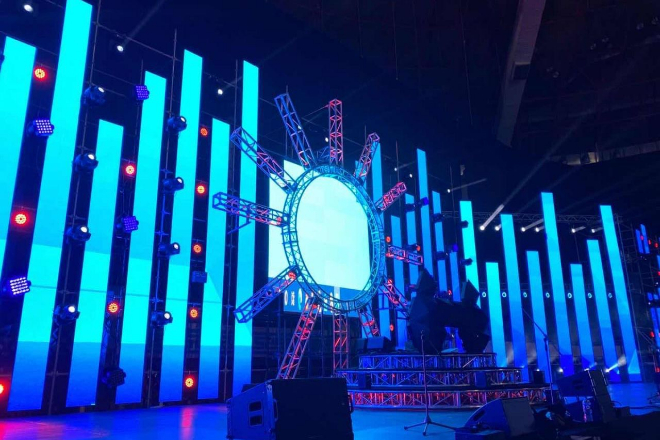介绍
1、LED屏在舞台表演中起什么作用?
LED屏幕在舞台表演中的作用实在是太神奇了,简直就是舞台上的“万能魔棒”,让表演变得更加炫酷多彩!
1). 增强视觉效果
1.1).提供丰富色彩及高清图像
LED屏幕,色彩绚丽夺目,图像清晰如实。想象一下,舞台上的演员们热情高涨地表演,身后的LED屏幕播放着与表演完美契合的高清画面。
视觉效果简直太棒了!这种高质量的图像显示不仅使舞台看起来更酷,而且使观众能够更专注地欣赏表演。
1.2).营造氛围,展现背景,突出主题
LED显示屏擅长营造氛围,例如在摇滚演唱会上,屏幕播放火焰、闪电等动态图像,瞬间点燃现场气氛!
它还可以作为舞台的背景墙,显示与演出内容相关的影像,让观众更清楚的了解演出的故事情节。有时候,显示屏还会突出一些主题元素,比如爱情、和平鸽等,让观众更深刻的感受到演出的主题和意义。
比如,如果是一场关于海洋的舞蹈表演,LED显示屏就可以播放海浪翻滚、鱼儿游动的图像,让观众仿佛置身于海洋之中,与舞者一起感受海洋的魅力与神秘。
这种视觉与表演的完美结合,让观众的观影体验更加震撼、难忘。
2). 演出内容的拓展
2.1).作为表演内容的延伸,展现更多实物无法呈现的元素
LED显示屏就像一个魔盒,可以展现很多实物无法呈现的元素。
例如在一场话剧演出中,有些场景可能很难用实物来还原,但通过LED显示屏就很容易将这些场景的画面展现出来,让观众更直观的了解剧情的发展。
在魔术表演中还可以利用显示屏展现一些虚拟魔术效果,让观众更加惊叹于魔术的神奇与魅力。
2.2). 互动表演及虚拟现实表演中的应用
LED显示屏在互动表演、虚拟现实表演中更是发挥着重要作用,如今的舞台表演越来越注重与观众的互动,而LED显示屏可以实现这种互动。
例如在演唱会上,显示屏可以显示观众的留言和互动信息,拉近歌手与观众之间的距离。
在虚拟现实表演中,LED显示屏可以配合VR技术,在虚拟环境中展现动态画面及特效,让观众仿佛置身于真实的虚拟世界,与表演者有更紧密的联系和互动。
2、LED显示屏屏体数量对演出效果有什么影响

1).积极影响:
1.1).扩大视觉覆盖范围,观众看得更清楚
当舞台上的 LED 屏幕数量增加时,视觉效果简直令人惊叹!无论您坐在场地的哪个位置,都可以清楚地看到舞台上的每一个细节。
就像是在超大屏幕上看电影一样,但比电影更加真实、更加震撼,这样一来,观众的整体观影感受肯定会大大提升,演出也会更加吸引人。
1.2). 多屏联动,打造沉浸式演出环境
当多块LED屏幕协同工作时,其效果就不是1+1=2那么简单了,它们可以联动在一起,根据演出内容,同步变换画面、特效。
例如在演唱会上,舞台四周的屏幕可形成360度的视觉包围,让你仿佛置身于歌手的世界,随着音乐的起伏,屏幕上的画面和灯光也随之变化,身临其境的感觉简直让人无法抗拒!
2).负面影响:
2.1). 视觉混乱,让观众眼花缭乱
但LED屏幕数量过多也存在问题,如果舞台上全是屏幕,而每块屏幕播放的内容又不一样,观众就会眼花缭乱,就像同时看好几档电视节目,不知道该看哪一档。
这样一来,观众就很难集中注意力,表演的重点和核心信息就可能被忽略。
2.2). 舞台布置、灯光设计面临挑战
LED屏幕太多,舞台布置和灯光设计就很头疼。屏幕占用空间,其他演出元素怎么摆放?而且屏幕的亮度和色彩又太抢眼。
灯光效果又该如何搭配呢?稍有不慎,就可能弄出一个“怪异”的舞台。所以,必须好好规划,让屏幕和舞台上的其他元素和谐共存。
2.3). 成本问题:钱包一定要鼓
最后,我们要说一下成本问题。LED屏幕并不便宜,买太多会掏空钱包。而且安装和维护这些屏幕需要花钱,还有能源消耗的问题。
演出结束后,电费也是一笔不小的开支,所以在决定购买多少块屏幕之前,要掂量一下自己的钱包是否够鼓。
总体来说,LED屏幕的数量对于演出效果有着双面的影响,用得好,可以让演出更加炫丽,观众更加满意;用得不好,可能会让观众眼花缭乱,打乱舞台布置,而且花费不菲。
所以在使用LED屏幕的时候,一定要规划好,不要盲目跟风,要根据演出的需求,观众的需求,预算来决定使用多少块屏幕,这样演出效果才能达到最佳!
3、舞台LED屏数量合理配置多少?
1). 根据演出类型配置
不同类型的演出,需要的LED屏幕数量有很大的差异,需要仔细分析,制定合理的配置方案。
1.1). 演唱会:
演唱会主要是听音乐、看歌手或乐队表演,所以不需要太多的LED屏幕。
主要用于背景中展示一些炫酷的图案或者动画,配合音乐节奏的变化,给观众带来视觉享受。一般来说,一到两块大屏幕就够了,太大会分散观众的注意力。
1.2). 戏剧:
戏剧表演更注重剧情的呈现和人物的演绎,可以利用LED屏幕来显示一些场景背景或者特效,比如闪电、雨、雾等。
但戏剧表演讲求真实感,画面不宜过多、过分抢眼,应适当融入舞台布景。
1.3). 舞蹈:
舞蹈表演更需要LED屏幕的衬托,舞蹈动作速度快,节奏感强,屏幕上可以显示一些与舞蹈动作完美契合的动态图案或者视频。
此时可以适当增加屏幕数量,让舞台更加绚丽,但要注意屏幕数量不宜过多,否则会让观众眼花缭乱。
2). 考虑观众的观点
观众的视角对LED屏幕的配置影响很大,一定要保证每一个观众都能得到良好的视觉体验,这是最重要的。
2.1). 透视问题:
首先要考虑观众的视角,舞台上的LED屏幕不宜过高或过低,让观众坐着或站着都能看清楚,另外屏幕的角度也要调整,让观众不会看到反光或眯着眼睛看。
2.2).配置原则:
因此我们在配置LED显示屏的时候,一定要遵循一个原则:保证每一个观众都能得到最好的视觉体验。显示屏的位置和数量可以根据场地的大小、形状等进行合理的安排。
例如大型体育馆可以设置多块显示屏,小型剧场可以设置少块显示屏,总之,观众无论坐在哪里,都要感受到舞台的魅力。
3).科技与艺术的结合
在配置LED显示屏的时候也要充分考虑技术与艺术的结合,技术虽然重要,但是艺术才是舞台的灵魂。
3.1). 技术手段:
现在科技这么发达,我们可以采用一些先进的技术手段来增强LED显示屏的表现力。
比如,采用高分辨率的显示屏,显示画面更加清晰;采用动态控制技术,使显示屏显示画面更加平滑;采用智能色彩调节系统,使显示屏色彩更加鲜艳夺目。
3.2). 保持艺术性:
但技术只是手段,艺术才是目的,我们在配置LED显示屏的时候不能只追求技术效果而忽视了舞台表演的艺术性。
显示屏要与舞台布景、灯光效果、演员表演等完美结合,形成一个有机的整体,这样观众在欣赏演出的同时,才能感受到科技的魅力和艺术的感染力。
4. 实际案例分析
1).周杰伦巡回演唱会
1.1).配置分析:
在周杰伦巡回演唱会中,舞台LED显示屏的配置堪称经典。在演唱会现场,联诚发为观众量身定制了一块高10米、直径12米的巨型LED球形屏幕。同时,每场演出还配备了近1500平方米的LED透明屏。
这些显示屏不仅数量适中,而且布局也极为合理,不仅凸显了舞台的核心视觉焦点,还通过透明屏的灵活排列,为观众提供了全方位的视觉享受。
1.2).成功经验:
- 布局合理:
巨型LED球形屏幕作为视觉中心吸引观众注意力,透明屏幕分布在舞台四周,增强现场氛围。
- 创新展示内容:
显示屏上的内容与周杰伦的音乐风格紧密结合,通过高清画质呈现复杂多变的舞台背景,并与音乐节奏紧密配合,营造出现代、魔幻的舞台氛围。
- 科技与艺术的结合:
利用高科技手段,提升显示屏的表现力同时保持舞台表演的艺术性,实现科技与艺术的完美融合。
结论
综上所述,舞台LED屏的数量并不是越多越好,而是需要根据演出类型、观众视角、技术与艺术相结合的原则进行合理配置。过多的LED屏可能会造成视觉混乱,影响观众的观看体验,同时也会增加舞台设计的难度和成本。
因此,在舞台设计中,要充分考虑LED屏幕的布局、内容的显示方式以及与灯光、音响等其他元素的配合,打造出一场既具有视觉震撼力又具有艺术感染力的舞台表演。
最后,如果你想了解更多关于 LED 屏幕的信息, 请与我们联系。

